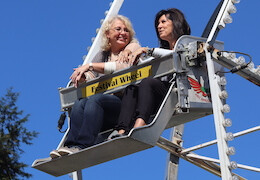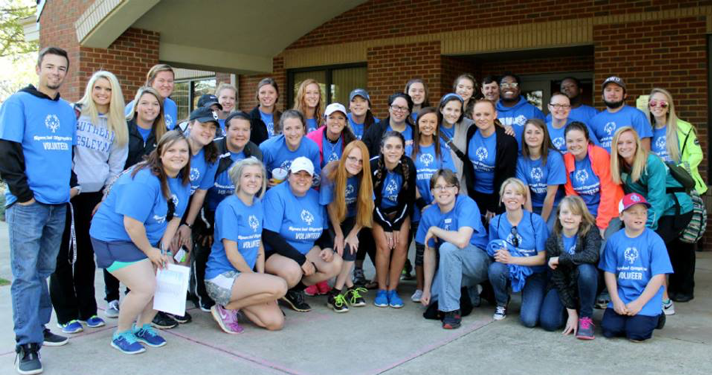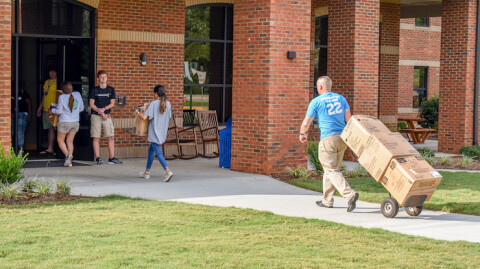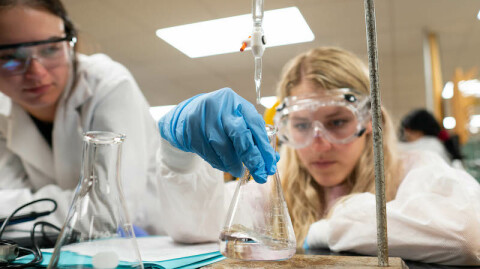Ten years ago, I was a curriculum coordinator in a local school district in South Carolina; now I am the Dean of the School of Education. It has been an exciting and unexpected journey. I started teaching as an adjunct instructor for SWU twelve years ago. When I retired after 37 years teaching in k-12 public education, I thought that I would just volunteer with church and community organizations and go to lunch with my friends—just enjoy life. I was so wrong. During the summer of my retirement, I received a call from SWU to talk about a fulltime position in the School of Education. This offer led me to teach for the next ten years helping to shape hundreds of educators to demonstrate a Christian ethic of care toward self, learners, colleagues, and community. After so many years in public education, it is refreshing to be able to pray with students in and out of class in the private Christian college setting, and to teach faith-based dispositions. My university emphasizes a Christian Ethic of Care as our main approach to developing ethical, Christian educators. Scripturally, the Christian ethic of care is based on the story of the Good Samaritan in Luke 10:25-37, where an injured traveler was passed over by a priest and a Levite. The Good Samaritan, who was despised by ordinary Jews, demonstrated an ethic of care toward a wounded traveler.
When God spoke to me on that day ten years ago, I chose to listen and began to teach future teachers. The quote, “Choose a work that you love, and you won’t have to work another day” (Confucius), describes my journey for the past decade in the School of Education. I love working with these future teachers. I began another phase in my life because I believed that God called me to prepare these young men and women for a rewarding and fulfilling career.
Ethic of Care towards Self
The Ethic of Care toward self is a concept that is often difficult to relate to students who are training to become teachers. I have always been convinced that educators should have a biblical approach to learning because teaching is a calling and a mission. When I came out of retirement to teach in Christian higher education, it was with the thought that I could help future teachers to be able to better foster this ethic of care toward themselves during their teaching career. An ethic of care toward self is often difficult for our student to embrace. But this tenant takes another step and extols the future teachers to not only have a passion for learning, but to treat the body as a temple—“do you not know that your bodies are temples of the Holy Spirit, who is in you, whom you have received from God? You are not your own. You were bought at a price. Therefore, honor God with your bodies” (Corinthians 6:19-20 New International Version).
"I have always been convinced that educators should have a biblical approach to learning because teaching is a calling and a mission."
Ethic of Care toward Learners
When I began to teach at SWU, I taught both graduate and undergraduate students. When I began teaching full-time, I worked more with pre-service teachers, and I was encouraged to see the growth in the pre-service students as they went into the public schools. It is interesting to note the stories that our students relate when they become so attached to the K-12 students that attend their schools. The clinical students voluntarily work after school to tutor, attend school events and even sponsor some of the events. One of our Early Childhood majors was in tears when her little kindergartener gave her a torn paper heart the day she came to tell the class “good-bye” (after completing her practicum hours) and brought the entire class cupcakes. The young kindergartener said that his heart hurt because she was leaving. Another clinical student met with all his 5th grade students’ parents so he could tell them how great their children were. A Physical Education major volunteered to assist in coaching the middle school softball team after completing his practicum. One music major freely directed the 4th grade Christmas program where all the moms cried, and all the dads beamed as they subtly brushed away tears. These actions mirror the things my university has been teaching for the past dozen years. The faculty cannot teach Education majors how to care, but they can and do model the caring with the university students.
Ethic of Care toward Colleagues
Jesus said unto him, “You shall love the Lord thy God with all your heart, and with all your soul, and with all your mind. This is the first and great commandment. And the second is like it, You shall love your neighbor as yourself.” (Matthew 22:36-40, NIV). Coming from a public K-12 environment, the concept of an ethic of care toward colleagues as well as toward learners was often a venture into a different culture. Many times, school faculty are siloed in their own grade level or subject areas, so it takes a conscious effort to move out of one’s comfort zone.
“You shall love the Lord thy God with all your heart, and with all your soul, and with all your mind. This is the first and great commandment. And the second is like it, You shall love your neighbor as yourself.”
- Matthew 22:36-40, NIV
At SWU, this culture of care toward colleagues extends beyond the boundaries of the School of Education to the greater university. I was heartened to note the overwhelming support offered to a colleague at the university with terminal cancer—the ethic of care toward colleagues took the form of monies to help with meals and transportation to the hospital in Atlanta for her chemotherapy. Additionally, students and faculty volunteered to help clean her house and provide childcare for her children. Faculty, staff, and students lifted up prayers and celebrated a service of healing at the university that was widely attended. I was and am still convinced that the service of healing helped extend her life for another year because of God’s intervention. Even in the midst of her illness, she still came to work teaching and ministering to her students. The students saw the entire university faculty rally around her. They also saw her care and love for each one of her students in the midst of her own illness.
Ethic of Care toward Community
“Rather, speaking the truth in love, we are to grow up in every way into him who is the head, into Christ, from whom the whole body, joined and held together by every joint with which it is equipped, when each part is working properly, makes the body grow so that it builds itself up in love” (Ephesians 4:15). Just as it takes all parts working together to ensure that the body grows, the School of Education has to work with all parts to ensure that the future teachers and the candidates grow and develop in love. One of the tenets of our mission is an ethic of care toward community which stems directly from the institution’s mission to be a generous organization and share our resources with the local and the global community. The School of Education had more than 60 education students who volunteered for the regional Special Olympics which was and still is hosted at our institution. It was inspirational to see the commitment and dedication of our students and faculty as they worked with the middle school participants in the Special Olympics.
“There should be no division in the body, but…its parts should have equal concern for each other” (I Corinthians 12:2, NIV).
The students participate in the Special Olympics and the Day of Service for the same reason they spend their fall, spring, and summer breaks going on mission trips. The students genuinely want to serve a need for the global as well as the local community. They feel a calling to work in the communities and to provide service to folks in need. This stems from a sincere need for spiritual fulfillment in their lives and not simply because classes are canceled on these special days.
Implications
I have been blessed for the past ten years to work at an organization that has the social and educational framework that fosters this Christian ethic of care. This type of culture is a by-product of purposeful individuals who formed and nurtured students in a caring environment. Our students constantly hear about a Christian ethic of care in F2F and online classrooms. We have chapels, special events, and programs that constantly confirm the university and the School of Education’s commitment to this culture of caring. However, the real litmus test is the fact that our faculty and students live out this ethic. During the past decade, I have had the honor of working with faculty and staff who not only foster, but champion a spirit of caring for our teacher candidates. I have also had the pleasure of working with teacher candidates who demonstrate this same ethic. The pre-clinical and Clinical students are often saddened to leave the K-12 students because they have formed relationships and attachments. These same graduates commit to teach in the mission fields, low-performing schools, and Title I school to make an impact on the young learners and the community.
In the words of Esther, “perhaps this is the moment for which I (sic) have been created” (Esther 4:14). I know these moments were the reason I was created during the past ten years as I retired from one career in public education and stepped into another career in private higher education. I really did not change careers, I simply changed the focus of my teaching career. God has always called me to teach, whether it has been in a Title I inner-city school or at a private Christian university.
References
Katz, M. S., Noddings, N., & Strike, K. A. (1999). Justice and caring: The search for common ground in education. New York, NY: Teachers College Press.
Noddings, N. (2002). Educating moral people: A caring alternative to character education. New York, NY: Teachers College Press.
Noddings, N. (2007). Philosophy of education. Cambridge, MA: Westview Press.







